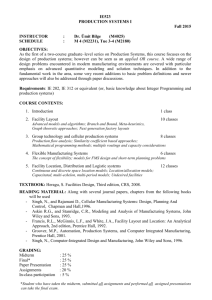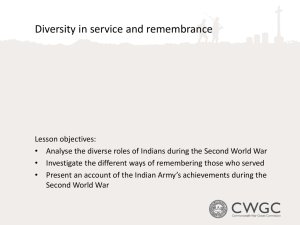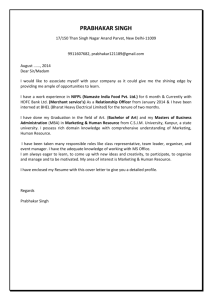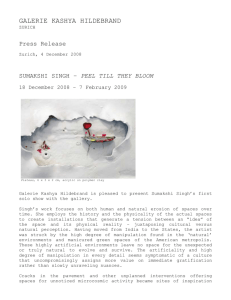Poetry Analysis of Singh Song
advertisement
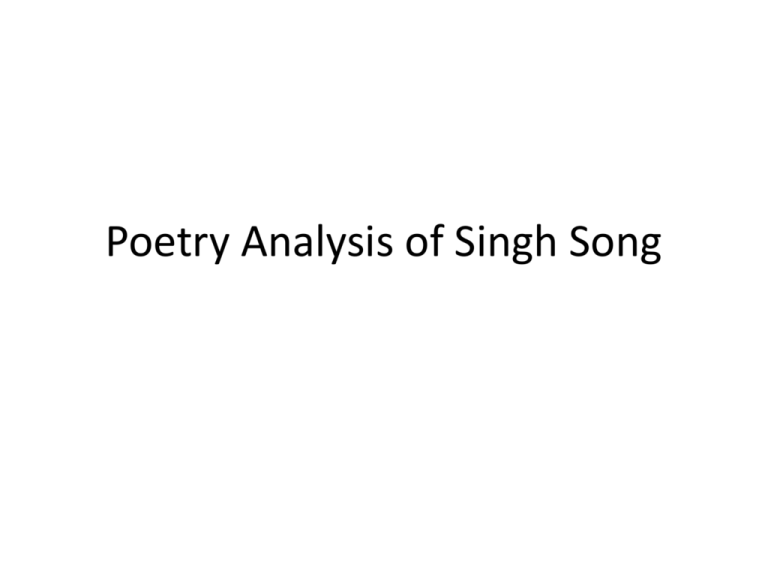
Poetry Analysis of Singh Song Subject • The poet has written Singh Song to be about the love of a couple who live in an Indian area of the UK. Shown to feel like outsiders, however seemingly very happy together. • The character Singh is a Sikh man who is seemingly rather laid back, “ven nobody in, I do di lock” and values his relationship more than he does success or money describing his wife as “priceless”. • He shows his adoration, affection and love for his “newly bride” and describing her tummy as a “teddy”, emphasising how he is besotted with her every feature. Point of View • The poem is written from the point of view and ideals of Singh, “I say” is repeated throughout the poem, showing that it is from his point of view, which feels more personal and therefore feels like he is communicating with the reader. • It is written to allow us to see Singh’s point of view and feels as though he is trying to almost show off how he loves his wife. • However there is an exterior unknown voice, shown through italics to give a sense of interruption and difference – in this we get another opinion, an idea of others point of view about Singh, which is shown to generally be negative as he and his shop are described as the “worst”. Language • The poem is formed out of English-Indian dialect ( showing Singh’s origins) and is shown through phonetics – the words are spelt how they sound in his accent. He uses ‘v’ instead of ‘w’, for example, “vee share”. This shows his background and history. • Informal- he uses words that are acquainted with children such as “daddy”, which shows the simplicity in his character, and almost childlike nature. • The use of (considered) British slang is also showing in the poem- showing the interracial development of his character. For example the affectionate term “baby”. Imagery • He uses humorous imagery to describe emotional moments, seemingly unable to take it seriously, or how hopelessly romanticised his point of view is, for example “after vee hav made luv like vee rowing through Putney” This shows his affection towards his wife and emphasises how he highly he values love. • This brings a lightness to the poem, which without would mean the poem may have had a darker message, for example “di worst Indian shop on di whole Indian road” would show how appallingly he runs his shop, put in a lighter manner implying he is happy. • The way he also describes his wife also shows his affection – he describes her as “priceless” and “Above his head”, showing how he is honoured to be married to her and how highly he thinks of her. • She is however a possible rebellion to the religion, as they glamourized her – “high heels”- and wears a “Donkey jacket” which is highly unusual. Form and Structure • Rhyming couplets creating a musical rhythm, a sing song effect. Therefore we can also see that the the title itself is a pun using the name Singh, instead of sing. From this we can infer the characteristics of Singh, that he has a childlike mentality and therefore uses a immature way of speaking, with rhythm. It therefore creates a sense of • The poem also uses phonetics, such as “di” and he writes his W as V. This shows how his accent is spoken and allows the reader to read directly how he would speak rather than infer. The writer Daljit Nagra, himself having Punjabi Indian parents, may have wanted to emphasise how Singh was different, and try to show this through the difference of pronunciation. • The poem’s structure does not stay the same throughout, but cycles through different stanza patterns, and finishes with a series of 2 line stanzas at the end to show the conversation between he and his wife. Tone • Singh Song, the entire way through, is full of affection and tenderness towards his wife. • Singh uses words that are considered cute or that describe his wife with affectionate nicknames or descriptions. Such as describing his wife as having “di tummy ov a teddy” from this we can infer that she is possibly rather rounded and that to Singh it is simply another point to a long list of things he seems to adore about his wife. • We can also see the respect Singh has for his wife, “tiny eyes ov a gun”, implying she is focused and keen, constantly ready and waiting. • All of these quotes are humorous, as is much of the poem. The way he uses words like “daddy” and talks about “her Sikh lover site” makes the reader smile and is funny because of the immaturity behind it. Whether its because it makes the reader almost feel condescending towards his foolishness or because on the reverse its adorable, it makes the reader laugh. Links • My Last Duchess – views on affection and possessive pronouns. • The use of the word “my” is common in both poems, however they are used differently; in My Last Duchess, the phrase is used to show possession and objectification of the duchess, showing he felt superior to her. In Singh Song, the phrase is used to show affection, the word “my” used in a different tone, showing a proudness and honor in having her as his wife and his equal. • Checking Out Me History- non-standard spelling. • Both poems use non-standard spelling as an accent for the voice of the narrator. They also both bringing other voices as narrator throughout, in Checking Out Me History it's the authority behind 'dem' and in this poem it's the voice of Singh’s complaining customers.
